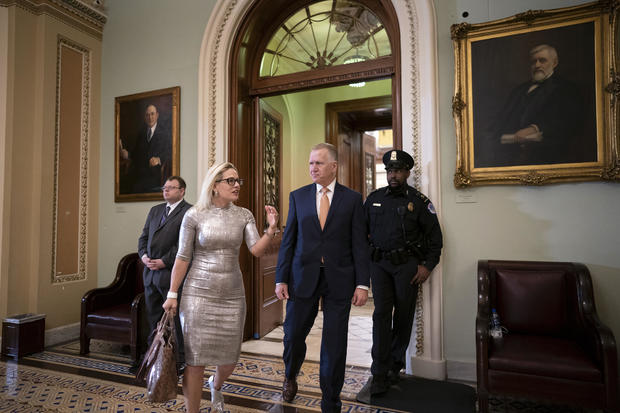
Washington — Negotiations in the Senate to forge a bipartisan compromise on U.S. immigration and border coverage unsuccessful to obtain adequate traction to go just before the conclusion of this session of Congress, dooming nonetheless a different effort and hard work to reform a process that has not been updated in decades, congressional officials common with the issue advised CBS Information.
Sen. Kyrsten Sinema of Arizona, an impartial who right up until very last 7 days was a Democrat, and GOP Sen. Thom Tillis of North Carolina had been discussing a probable offer that would have bundled the legalization of a subset of the tens of millions of unauthorized immigrants residing in the U.S., as effectively as specified steps aimed at reducing illegal crossings alongside the U.S.-Mexico border.
But Sinema and Tillis did not strike a offer that would have been in a position to secure the important 60 votes in the evenly divided Senate during the lame-duck session, a few congressional officials stated, requesting anonymity to explain the outcome of interior negotiations.
The very long-shot bid marks Congress’ most up-to-date failure to pass a regulation designed to overhaul an immigration technique it has not noticeably up to date considering that the 1990s and that Democratic and Republican lawmakers have mentioned is in desperate need of reform.
The failure to reach a deal throughout the lame-duck session also dampens prospective buyers of a bipartisan arrangement on immigration in the in the vicinity of upcoming, due to the fact Republican lawmakers will acquire management of the Household in January and have vowed not to grant “amnesty” to any team of unauthorized immigrants.
J. Scott Applewhite / AP
One of the congressional aides familiar with the talks reported there was not enough time for Sinema and Tillis to reach a deal prior to the conclude of the year, specifically given ongoing initiatives to pass federal government funding payments. The aide stated a framework stemming from the talks could serve as the foundation for a monthly bill in the future Congress.
In an interview with Politico last week, Sinema said she and Tillis were being performing on the “most tricky political concern of all of our professions.”
The talks among Sinema and Tillis concentrated on giving a route to lasting legal standing to “Dreamers,” or unauthorized immigrants introduced to the U.S. as small children, a longtime Democratic precedence. They also sought to deal with Republican fears about the unprecedented ranges of border arrivals recorded more than the previous calendar year.
In accordance to folks acquainted with the negotiations, the border-related merchandise floated as element of the talks integrated increasing the salaries of Border Patrol agents and bolstering their ranks, offering added resources to the Division of Homeland Stability for detention facilities and deportations and enacting further penalties for migrants who do not show up at their court docket hearings.
Other proposals integrated the establishment of processing facilities to establish whether or not migrants have credible asylum instances and an extension of the Title 42 pandemic-connected border constraints, which have authorized the U.S. to expel hundreds of hundreds of migrants on public wellbeing grounds because 2020. The plan, which blocks migrants from in search of asylum, is set to conclude on Dec. 21 because of a court ruling.
One of the explanations negotiators attained an deadlock was mainly because of a Republican demand from customers to control releases of migrants into the U.S., which includes by terminating the Flores settlement, a court docket settlement that limitations the detention of migrant youngsters, two congressional officers explained.
While the talks among Sinema and Tillis been given expressions of guidance from reasonable lawmakers and corporations, they also garnered criticism from critics on each the still left and correct.
Immigration hardliners and some Republican lawmakers criticized the legalization proposal for Dreamers, saying the U.S. should not be granting “amnesty” to immigrants residing in the U.S. devoid of lawful permission amid history arrivals of migrants along the southern border.
Progressive advocates and lawmakers, on the other hand, denounced the border-similar proposals, together with the Title 42 extension, saying they would undermine the rights of asylum-seekers.
Republican Sen. John Cornyn of Texas, who has earlier floated bipartisan immigration compromises, advised Reuters this week that the Sinema-Tillis talks had been “not going any place.”
For decades, Congress has remained gridlocked on immigration difficulties, with main bipartisan initiatives to modify U.S. immigration legislation faltering in 2018, 2013 and 2007. The 1st monthly bill to legalize Dreamers, for case in point, was launched about two decades back, in 2001.
Advocates for immigrants have urged Congress to legalize this populace offered the authorized challenges that threaten the existence of the Deferred Action for Childhood Arrivals (DACA) program, an Obama-era coverage that shields approximately 600,000 Dreamers from deportation and makes it possible for them to operate in the U.S. lawfully.
A federal judge in Texas who has earlier located DACA to be illegal is set to rule on the program’s legality at the time once more future yr.









